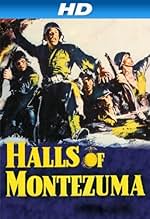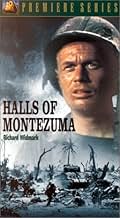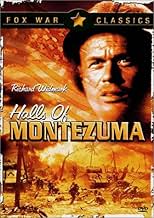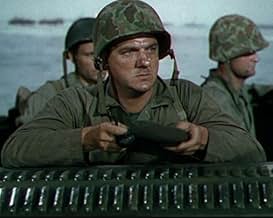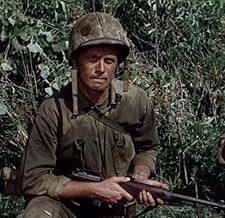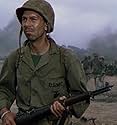IMDb-BEWERTUNG
6,6/10
3102
IHRE BEWERTUNG
Eine Marineinfanteriekompanie versucht in einem Wettlauf mit der Zeit, eine japanische Raketenbasis zu finden.Eine Marineinfanteriekompanie versucht in einem Wettlauf mit der Zeit, eine japanische Raketenbasis zu finden.Eine Marineinfanteriekompanie versucht in einem Wettlauf mit der Zeit, eine japanische Raketenbasis zu finden.
- Regie
- Drehbuch
- Hauptbesetzung
Jack Palance
- Pigeon Lane
- (as Walter {Jack} Palance)
Richard Allan
- Pvt. Stewart
- (Nicht genannt)
Edward Binns
- First Soldier in Final Tracking Shot
- (Nicht genannt)
Robert Board
- Marine
- (Nicht genannt)
Robert Bohannon
- Soldier
- (Nicht genannt)
Empfohlene Bewertungen
When it was released in 1950, "Halls of Montezuma" was one of the most realistic and ambitious war movies yet made. Today its strengths still outweigh its unfortunate flaws. The flaws are an all-too-familiar sentimental streak, an absurd "revelation" about Japanese tactics, an unconvincing psycho in a clumsy explanatory flashback, and the unlikely presence, in Lt. Anderson's platoon, of a replacement who just happened to have been one of his high-school students in civilian life.
Many viewers will find such flaws even more annoying because they detract from the good things about this movie, including some solid performances (Widmark, Palance, Boone, Webb) a realistic plot, an unusually authentic look--including some (mostly) well integrated combat footage--and a spectacular scope. Until "The Longest Day" (1961), the beach landing here(with flame-throwing tanks)and the later assault on the Japanese were more impressive than any other screen depictions of a large military operation. (BTW, the failure of the Japanese to oppose the landing itself isn't a Hollywood howler; the movie accurately reflects the Japanese defense strategy on Okinawa in 1945.) Milestone's directorial masterpiece, "All Quiet on the Western Front" (1930), expresses revulsion at the slaughter of World War I. "Halls of Montezuma" affords a more complex view of men in World War II. The hero is a high-school chemistry teacher whose migraines have addicted him to painkillers; he doesn't care because he assumes he's going to be killed. One character is blinded and another killed by accident. By modern standards such incidents may seem relatively mild, but during the war such troubling images were thought to be too disturbing for film-goers. Even in 1950 they were strong stuff for a movie.
Made at a time when the Cold War was heating up dangerously in Korea, "Halls of Montezuma" is still a revealing postwar response to World War II in the Pacific.
Many viewers will find such flaws even more annoying because they detract from the good things about this movie, including some solid performances (Widmark, Palance, Boone, Webb) a realistic plot, an unusually authentic look--including some (mostly) well integrated combat footage--and a spectacular scope. Until "The Longest Day" (1961), the beach landing here(with flame-throwing tanks)and the later assault on the Japanese were more impressive than any other screen depictions of a large military operation. (BTW, the failure of the Japanese to oppose the landing itself isn't a Hollywood howler; the movie accurately reflects the Japanese defense strategy on Okinawa in 1945.) Milestone's directorial masterpiece, "All Quiet on the Western Front" (1930), expresses revulsion at the slaughter of World War I. "Halls of Montezuma" affords a more complex view of men in World War II. The hero is a high-school chemistry teacher whose migraines have addicted him to painkillers; he doesn't care because he assumes he's going to be killed. One character is blinded and another killed by accident. By modern standards such incidents may seem relatively mild, but during the war such troubling images were thought to be too disturbing for film-goers. Even in 1950 they were strong stuff for a movie.
Made at a time when the Cold War was heating up dangerously in Korea, "Halls of Montezuma" is still a revealing postwar response to World War II in the Pacific.
This is one of a slew of WW2 films made in the late 40's and early 50's, some better than others. This is definitely one of the better ones. This film features a whole bunch of future stars, such as Richard Widmark, Karl Malden, Richard Boone, Jack Palance, Robert Wagner, Jack Webb and Martin Milner. Most of them hadn't completely honed their skills yet and a couple of the performances are either a bit wooden (Malden, Wagner and Webb) or overdone (Widmark). The technology is very primitive by today's standards, yet this film holds up well. The acting aside, it seems that every effort was made to make the film as realistic as it could be. In that respect, this film is much better than some of the others of the same era. There are a lot of films from this era. If you choose to watch only a few of them, make sure this is one of the few.
At age 10, in 1960, I watched the "Halls of Montezuma" movie on television. In 1968, I found myself in the U.S. Marine Corps serving as a machine-gunner in the infantry. Sometimes, movies have a way of becoming true reality; and, because the movie gave me a little insight and understanding of the brutality of war, in some way, I owe a debt of gratitude to the movie.
I was surprised that Halls of Montezuma was not an adapted play since a great deal of the action takes place in a cave that serves as a battalion headquarters where Colonel Richard Boone is trying to extract information from prisoners.
That in itself wasn't easy because the Japanese were not known for surrendering. Boone gives an order to try and take prisoners on this landing on an unnamed Pacific island.
Richard Widmark's company finds a few of them and it's a rough go and several members of Widmark's command die in the mission. The Japanese are firing a lot of rockets from a hill and the bombing from planes doesn't do any good. Before the big push towards that hill can be made those rockets have to be dealt with.
A lot of promising young players from 20th Century Fox were in Widmark's platoon like Robert Wagner, Jack Palance, Richard Hylton, Skip Homeier, Martin Milner. Some make it and some don't. There are several flashback sequences showing these guys in their civilian lives and earlier in the war.
At the headquarters there's also quite an assortment, Jack Webb a war correspondent, Philip Ahn an articulate Japanese prisoner who is a baseball player in civilian life and looking decidedly out of place there is the urbane Reginald Gardiner replete with cigarette holder. He's along for the ride because he's an expert on Japanese culture and psychology and speaks the language.
Halls of Montezuma is a good, not a great war film. Three performances do stand out. Karl Malden as the veterinarian now serving as a medic and career marine Bert Freed and his sergeant Neville Brand.
That in itself wasn't easy because the Japanese were not known for surrendering. Boone gives an order to try and take prisoners on this landing on an unnamed Pacific island.
Richard Widmark's company finds a few of them and it's a rough go and several members of Widmark's command die in the mission. The Japanese are firing a lot of rockets from a hill and the bombing from planes doesn't do any good. Before the big push towards that hill can be made those rockets have to be dealt with.
A lot of promising young players from 20th Century Fox were in Widmark's platoon like Robert Wagner, Jack Palance, Richard Hylton, Skip Homeier, Martin Milner. Some make it and some don't. There are several flashback sequences showing these guys in their civilian lives and earlier in the war.
At the headquarters there's also quite an assortment, Jack Webb a war correspondent, Philip Ahn an articulate Japanese prisoner who is a baseball player in civilian life and looking decidedly out of place there is the urbane Reginald Gardiner replete with cigarette holder. He's along for the ride because he's an expert on Japanese culture and psychology and speaks the language.
Halls of Montezuma is a good, not a great war film. Three performances do stand out. Karl Malden as the veterinarian now serving as a medic and career marine Bert Freed and his sergeant Neville Brand.
- Despite it's grand name, Halls of Montezuma is a small war film. What I mean is that the movie focuses more on a small group of men and their fears and problems than it does on a grand plan for Allied victory. It's a very personal movie. We get to see these men up-close and we begin to develop feelings for them. I wouldn't doubt that this is one of the first films to show a U.S. Lieutenant so battle scarred that he resorts to using pain killers just to function. Unlike other war films of this era, not all of these men are going to make it to the end. War is like that. It doesn't pick and chose people to live because we like them. So in that regard, it's also more realistic than some other war movies made in the 50s.
- To succeed as a small, personal war movie as I've described, the cast has to be able to act. This cast does not disappoint. Richard Widmark, Jack Webb, and Karl Malden are all excellent in their respective roles. I was especially impressed with Webb who has an acting style that can grate on the nerves. He's more subdued here and it works. But as good as these three are, Jack Palance is the highlight of the movie for me. He was undoubtedly the most believable. I could really picture him doing the things in real life that were called for in the script.
- I have no difficulty recommending Halls of Montezuma to fans of war films. It's a very welcome addition to my DVD collection.
Wusstest du schon
- WissenswertesUS Marine and Navy units participated in the filming of this movie and after their work was finished, they went to fight in Korea.
- PatzerWhile speaking to his superiors on his walkie-talkie, Lt Anderson twice closes his conversation with "Over and out." This is incorrect. He should have said either "Over" (if he was turning the conversation over to the other speaker), or "Out" (if he was ending the talk). Interestingly, Anderson uses the correct term "Out" later in the film.
- Zitate
Sgt. Randolph Johnson: Wasn't there a comment by your General Sherman about war?
Lt. Butterfield: Yeah, he said, "War is Hell." What did he know, that eight-ball never left the States.
- Crazy CreditsCurrent prints open with the mid 1980's 20th Century Fox logo.
- VerbindungenEdited into Brückenkopf Tarawa (1958)
- SoundtracksMarines' Hymn
(uncredited)
Music from the "Gendarmes' Duet" from the opera "Geneviève de Brabant"
Written by Jacques Offenbach
Sung over the opening credits
Also played during the first landing
Top-Auswahl
Melde dich zum Bewerten an und greife auf die Watchlist für personalisierte Empfehlungen zu.
- How long is Halls of Montezuma?Powered by Alexa
Details
- Erscheinungsdatum
- Herkunftsland
- Sprachen
- Auch bekannt als
- Hasta el último hombre
- Drehorte
- Marine Corps Base Camp Pendleton, Kalifornien, USA(I know this, as my father was in boot camp at the time and his squad were used as extras for four days at this location, for this film.)
- Produktionsfirma
- Weitere beteiligte Unternehmen bei IMDbPro anzeigen
- Laufzeit
- 1 Std. 53 Min.(113 min)
- Seitenverhältnis
- 1.37 : 1
Zu dieser Seite beitragen
Bearbeitung vorschlagen oder fehlenden Inhalt hinzufügen


